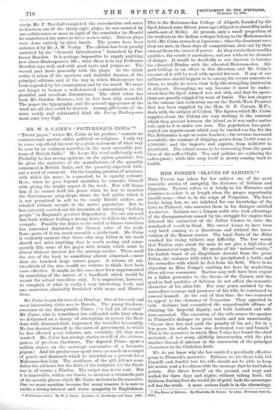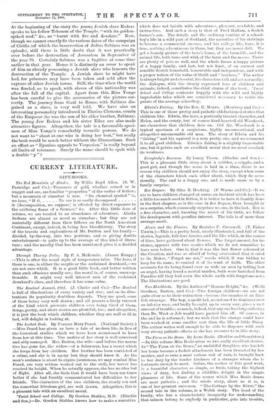MISS YONGE'S " SLAVES OF SABINUS."* Miss YONGE has taken
for her subject one of the most romantic stories of antiquity, the fortunes of Sabinus and Epponina. Tacitus refers to it briefly in his Histories, and promises to relate it at length when the proper opportunity should come,—that is, in the reign of Vespasian. The later books being lost, we are indebted for our knowledge of the facts to Plutarch, who narrates them in his dialogue entitled Antatorius. Sabinus was a Lingon noble who took advantage of the disorganisation caused by the struggle for empire that followed the extinction of the Julian Cmsars to raise the standard of revolt in Gaul. His career seems to have been very brief, coming to a disastrous end without the inter- vention of the Roman armies. The loyal State of the ./Edni crushed his rising without any difficulty. The few words that Tacitus says about the man do not give a high idea of his character or capacity. He speaks of his "natural vanity," his foolish boast of an illegitimate descent from the great Julius, the rashness with which he precipitated a battle, and the cowardice with which he fled from the field. There is no objection to Miss Yonge's exalting her hero by neglecting these adverse comments. Tacitus may well have been unjust to a fallen pretender to the throne of the Caesars, and the good or bad qualities of Sabinus do not affect the romantic character of his after-life. For nine years, assisted by the marvellous courage and prudence of his wife, he continued to conceal himself. At the end of that time, the two ventured to appeal to the clemency of Vespasian. They appealed in vain. Sabinus had committed the unpardonable offence of claiming the Imperial dignity, and both husband and wife were executed. The execution of the wife rouses the speaker in Plutarch's dialogue to great wrath, and not unnaturally. " Cmsar slew her, and paid the penalty of his act ; for in a few years his whole house was destroyed root and branch." This is the narrative in which Miss Yonge has found the chief materials of her story, skilfully interweaving with the plot another thread of interest in the conversion of the principal characters to the Christian faith.
We do not know why she has omitted a peculiarly effective point in Plutarch's narrative. Sabinus, we are there told, hid himself, and, fearful lest his wife should not be able to keep his secret, sent a freedman with the message that he had taken poison. She threw herself on the ground, and wept and wailed for three days and nights, without taking food; till Sabinus, fearing that she would die of grief, bade the messenger tell her the truth. A more serious fault is in the chronology.
• The Slaves of Sahinue. By Charlotte M. Tonga. London: National Soci3ty„ 1890.
At the beginning of the story the young Jewish slave Esdras speaks to his fellow Telamon of the Temple, " with its golden- spiked roof," &c., as " burnt with fire and desolate." Now, though we cannot exactly fix the various dates of the campaign of Civilis (of which the insurrection of Julius Sabinus was an episode), still there is little doubt that it was practically over before the destruction of Jerusalem in September of the year 70. Certainly Sabinus was a fugitive at some time earlier in that year. Hence it is distinctly an error to speak of him as already possessing a Jewish slave who laments the destruction of the Temple. A Jewish slave he might have had, for prisoners may have been taken and sold after the capture of other Jewish towns. Still, the time when the world was flooded, so to speak, with slaves of this nationality was after the fall of the capital. Apart from this, Miss Yonge has been careful to give the accessories of the picture cor- rectly. The journey from Gaul to Rome, with Sabinus dis- guised as a slave, is very well told. We have also an interesting personality introduced in Flavius Clemens, cousin of the Emperor (he was the son of his elder brother, Sabinus). The young Jew Esdras and his sister Edna are also made attractive figures. Altogether, the tale is a favourable speci- men of Miss Yonge's remarkably versatile powers. We do not want to " shoot at one who is doing her best," but really the book would be much better without the illustrations. Such an effort as " Eponina appeals to Vespasian," is really beyond all limits of tolerance. Surely the name should he spelt with a double " p " ?



















































 Previous page
Previous page